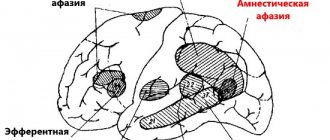Fear, anxiety Irina Vasilyeva You will probably be surprised, but the fear of going crazy is a fairly common occurrence in the world of mental disorders. It is one of the variants of hypochondria and consists of constantly searching for symptoms of a serious illness, in particular insanity, when there is no reason for it. Agree, there is some irony in this - to get sick only because you suspect you have an illness. What to do if you have already started to worry about it? How can you tell the difference between real symptoms and those caused by anxiety and worry? We'll talk about this today.
Good afternoon, dear reader! It is more than possible to go crazy just from the fear of “losing your mind.” Indeed, in a broad sense, the fear of getting sick is called hypochondriacal disorder. But today we will look at only one aspect of this disorder: the fear of contracting a psychiatric illness. Is it possible to easily get sick just from thinking about illness? Let's start with the reasons.
Common causes
- Violation of the coherence of the cerebral cortex due to physiological changes in the body (age-related, hormonal changes)
- Impaired functioning of the senses or distorted perception of information coming from them (due to the use of chemicals, medications)
- Vegetovascular dystonia (VSD), accompanied by unpleasant sensations in the form of depersonalization, derealization, somatic symptoms, giving rise to uncontrolled strong fear
- High anxiety, suspiciousness, the appearance of obsessive thoughts
- Superstitions, mysticism, the feeling of being “pursued” by karma for sins committed
- External provoking factors (careless words of specialists, thoughtless reading of medical reference books and searching for information on the Internet)
- Rich imagination, increased level of empathy
Often behind the fear of going crazy lies the fear of death. Indeed, for the psyche, becoming crazy symbolically means becoming completely different, incomprehensible, that is, completely ceasing one’s previous existence. And having dealt with the fear of death, you can not only part with empty fears, but also see in a new way the beautiful aspects of life that have already become familiar.
Practice shows that fears often arise in people who, for some reason, forbid themselves to feel. After all, feelings make us open and vulnerable.
But insensibility means death for the psyche, so it tries, as best it can, through fears to help us become alive again.
As you can see, the causes are quite varied.
The fear of developing a mental disorder can develop both against the background of a minor physiological disorder, and against the background of neurotic manifestations in an anxious and suspicious person, in a person with a rich imagination.
The desire to be “not like everyone else” and the romanticization of disorders
To a large extent, the search for psychiatric disorders in oneself is facilitated by the general romanticization of mental disorders.
Just look at the young people on social media. One puts her in the status of “severe depression” and posts artistic photos with sad eyes every day, the other writes about herself as “sociopath” and this in no way prevents him from actively communicating with subscribers.
Being “different from everyone else” is becoming incredibly fashionable, a kind of youth trend. Having discovered even the slightest hint of ill health, a young man, wanting to “be on trend,” urgently turns to a specialist and tries to convince him of the presence of the disease.
I can remember several cases from my practice. One day a girl came to me and suspected she had schizophrenia. She said so right from the door: “I have schizophrenia. I hear voices".
A detailed analysis of the situation revealed that she was a big fan of one popular mystical program. One of the characters in this program allegedly suffered from schizophrenia, but did not want to be treated because, thanks to his illness, he “heard the voices of the dead.”
The young girl really wanted to be like him, so she also began to interpret her ordinary everyday thoughts as “voices of the dead.”
The “patient” was treated as follows. She was described the procedures that she would undergo in the treatment of her fictitious illness, after which the “voices” immediately fell silent and did not bother her anymore.
A somewhat comical incident, isn't it? Unfortunately, there are also tragic stories on this topic, which I will not talk about, so as not to traumatize an overly impressionable reader.
This fashionable trend, which I call the “romanticization of mental disorders,” is only gaining momentum. And few young people, succumbing to the influence of fashion, think about how easy it is to harm themselves by inventing a non-existent disease.
Treatment
It should be understood that losing control of oneself is not always as scary as it seems; millions of people experience such fear. Every day we risk something, and sometimes losing control of ourselves is useful in terms of psychological relief. We are talking about the loss of control over emotions: you can cry right in public and not be afraid of condemnation, throw a tantrum with breaking dishes, tearing old clothes. This method of psychological unloading will help release all stagnant emotions, after which the desired relief will come, fear and panic will go away. Having thrown out all the grievances, you will experience relief, an incentive to live will appear, and all due to the release of adrenaline into the blood.
Psychotherapy sessions will help you overcome fear, where you describe in detail your fears, mental and physical state. If necessary, the psychotherapist will prescribe you sedatives that will relieve irritability and relax you. They may also recommend a massage aimed at relaxing the muscles of the spinal region.
You can use the method of letting go of the problem yourself. Its essence is as follows: it is necessary to outline fears and problems on a landscape sheet. Take a pen and sit down to write a letter without an addressee.
Write how difficult it is for you to live, explain why this happens, describe all your grievances and immediately forgive your offenders. When everything is written, do with the sheet in any way. Destroy. You can burn it or tear it into small pieces.
What to do?
If you are afraid of going crazy, I hasten to reassure you; psychotic and borderline states do not have this fear.
On the contrary, they consider themselves as healthy as possible, and the rest of the world is sick.
But neurotic disorders, the consequence of which is the fear of going crazy, are reversible. Your fear indicates that you have a critical attitude towards yourself, which reliably protects you from madness.
Severe anxiety about your own health, as a rule, indicates that you have neurotic conditions.
What to do? Of course, first of all, treat your neurosis. That is, without delay, contact a specialist. If you are already doing this and there are no results, you need to change your treatment strategy and even, possibly, your therapist.
This means that in the fight against the fear of going crazy, we do not treat the fear itself, but work with its cause - neurosis. Get rid of neurosis - forget about anxiety and fear.
Help
First of all, a person suffering from fear needs to understand that the manifestation of obsessions does not indicate a real subconscious desire to commit one or another unwanted act. On the contrary, with OCD the patient is terrified of hurting someone or killing himself; that is why alien thoughts are so persistent. In addition, the patient needs to understand that all his obsessive manifestations do not mean the development of insanity.
A highly effective treatment method is psychotherapy in combination with medications (antidepressants, anxiolytics and beta blockers).
During sessions, the psychotherapist may use techniques such as cognitive behavioral techniques, hypnosis, NLP, as well as exposure and warning techniques. The effect of psychotherapeutic treatment can last for several years.
The fear of committing an uncontrollable action can manifest itself in a person of any age and, in the absence of adequate treatment, persist throughout life. The presence of such fears gives a person acute mental pain and negatively affects many aspects of his life. A lack of understanding of the characteristics of such manifestations often leads to the fact that patients begin to consider themselves dangerous and crazy, but the occurrence of obsessive ideas in OCD does not at all indicate that the person is a threat to himself or others.
The mechanism of the appearance of neuroses
It should be said that the appearance of neuroses is facilitated by a whole cocktail of individual personality characteristics and environmental factors. Often people like to blame a traumatic situation for the appearance of neurosis, but this is not entirely true.
Most people suffering from neuroses, including the fear of going crazy, already had anxious preconditions before the traumatic situation arose. And sometimes they provoked it themselves.
The personality of a neurotic always does not coincide with the clichés and stereotypes imposed by his environment. The neurotic seems to be trying to understand his place in the environment and comes to understand the great difference between himself and the cultural aspects of society, its traditions.
All this leads to a deep intrapersonal conflict, the expression of which is neurosis.
That is, neurosis is a kind of defensive reaction of our body, our psyche to the discrepancy between what is desired and what is actual, between ambitions and real possibilities.
All this is accompanied by increased anxiety associated with society’s assessment of the individual, with the discrepancy between his reactions to events and the expectations of other people.
How does a neurotic feel when he is afraid of going crazy?
Let me remind you that the natural feeling of fear, invented by nature to protect us from danger, turns into an enemy in a neurotic. The enemy of man himself. It no longer has a useful function of protecting the body, but turns into a slow destroyer of a person’s physical and mental health.
At a conscious level, this can be expressed in the following symptoms
Panic states
They arise when it is necessary to make a choice, as well as in situations that are unusual for a person. At the same time, physical health may also suffer. A person suddenly feels feverish, the mere thought of difficulties makes him dizzy, his heartbeat quickens, and his limbs begin to tremble.
Severe anxiety
Thoughts in this case are always directed to the future. A person is afraid of a repetition of panic attacks and fear, a repetition of the traumatic situations that caused this fear. A person listens to his feelings and notes the disorder in his body and thoughts. He is visited by an obsessive fear of losing control over the situation.
Fear of what didn't happen
This is associated with the development of phobias, depression, and chronic fears. For example, fear of death and fear of darkness are directly related to the presence of neuroses.
A person, even experiencing drowsiness, cannot fall asleep. His imagination paints him terrible pictures of his own powerlessness and defenselessness in the face of an unknown danger.
Signs
Symptoms of fear of loss of control, even to the point of complete insanity, include the fear of losing the ability to clearly monitor one's thoughts and actions. It often seems to neurotics that they are about to go crazy or fall into some kind of global uncontrollable hysteria. They will begin to run, scream, tremble and twitch. Or just say utter nonsense.
Many people have a fear of uncontrollable physiological reactions: vomiting, bowel and bladder emptying, fainting, etc.
Another common fear is the fear of harming someone close to you.
Neurotics suffering from fear of loss of control often have thoughts such as:
- What happens if I lose control?
- What happens if I do something terrible?
- What happens if I start talking nonsense?
- What happens if I show myself to be a fool?
- What will people think of me?
Like any other neurotic symptom, fear of loss of control can show symptoms almost constantly. Or do it from time to time. At the same time, phobic thoughts themselves can vary from extremely strong, completely knocking out all other thoughts from the head, to very weak, barely perceptible.
Sometimes these thoughts can be clearly associated with a stressful event. And sometimes they can “cover” out of the blue.
Against the background of fear of loss of control over oneself, other physiological and mental neurotic symptoms often manifest themselves.
It should also be noted that the fear of losing control and going crazy may manifest slightly differently in people who suffer from phobic anxiety disorder with panic attacks and those who have obsessive-compulsive disorder (OCD).
During a panic attack (still often referred to in our country as an attack of vegetative-vascular dystonia - VSD), people are more afraid of losing control over themselves here and now: embarrassing themselves, falling, staining a subway car with vomit, etc. That is, the most strongly expressed is not so much the fear of madness as the fear of losing control over one’s physiological functions. Many are also afraid of attacking others.
Neurotics with OCD are more focused on the fact that they are slowly but surely going crazy. Fear in this case is not as intense as in panic, but it almost never leaves a person.
What to do when fear has already taken hold of you?
Detail
Never turn away from your fear. Give yourself permission to be afraid of him. And if you succeed, be afraid with all your might, but at the same time put the fear into categories. What does it consist of? What happens if fears come true? What led to the emergence of such a fantasy?
Playing with fear in this way allows you to understand the absurdity of thoughts and events.
I’ll try to give an algorithm of questions that you need to ask yourself.
- Which of my relatives have already gone crazy?
- Why did this happen?
- What will I do when I go crazy?
- Will I feel good in this state or bad?
- How to determine that a person has already gone crazy?
- Are there any crazy people among my friends?
- How does this manifest itself for them?
- What signs of mental illness do I already have?
- Why did I decide that these signs indicate a psychiatric disorder?
By answering each of these questions in sequence, you will gradually come to the conclusion that you are more normal than most of those around you. And each of us has oddities, peculiarities of behavior, thinking, as well as somatic diseases. This is often what shapes our individuality.
Concretizing fantasies and fears helps to get rid of them.
Love yourself
Neurotics in the vast majority of cases suffer from lack of self-acceptance. Trying to adapt, to please the imposed standards, they feel strong resistance coming from within.
The manifestation of self-sacrifice, auto-aggression, self-hatred is formed into neurotic fear. To discover its presence, you need to allow yourself to be natural, free. Learn to relax and stop catering to far-fetched ideals and fantasies.
I won’t lie, it’s incredibly difficult to do this at first. The support of your psychologist or psychotherapist can help you with this.
Why not a loved one?
Because the whole secret of neurotic fear is that, first of all, you try to meet the expectations of those close to you, worry about maintaining good relationships with them, and sacrifice yourself.
A therapist or psychologist can help you maintain good interpersonal relationships without damaging your psyche. He will teach you how to properly express your feelings and your individuality in a way that will be heard and understood.
Loving yourself along with your “shortcomings,” often invented, is an incredible leap in self-development and in the fight against fears and neuroses.
Get in touch with your needs
Often a person blocks his desires, tries to replace them with others, to sublimate the energy allocated by the body to satisfy needs.
Sometimes feelings of guilt or shame prevent you from admitting what you really want.
Even if it is not possible to realize a need, simply recognizing it, admitting to yourself that it exists, is already a serious step in overcoming neurotic fears. Even conscious sublimation (substitution for the fulfillment of a need) is much more healing than unconscious sublimation.
In art therapy, for example, in the fight against increased anxiety, the technique of materializing fear is often used. When terrible, uncontrollable fear takes on color and shape, it suddenly turns out that it is not so scary after all.
During psychotherapeutic work, an opportunity is created to touch with your hands, to realize, to come into contact with what a person has been hiding from himself for a long time.
This allows you to find resources for its transformation into another, more acceptable for expression, feeling.
Stop “Deserving” Love
Neurotics sin by constantly trying to find confirmation of their own importance from the world around them. It seems to them that by making mistakes, failures, quarrels and arguments, they are “terrible” people, unworthy of respect and recognition.
Therefore, they often sacrifice themselves, always wear a “happy” smile on their face, and constantly broadcast their own success and positivity outward.
For some failures they blame themselves more than anyone else. They also experience a strong sense of guilt for all the misfortunes of the world.
At the same time, within themselves they can be extremely negatively disposed towards slackers, losers, wasters of life and other parasites who do not share their life concept.
Characteristic
To begin with, I want to emphasize that concepts such as fear and phobia should be distinguished. Despite the fact that they have similar features in manifestation.
Fear is a completely natural feeling that allows a person to take care of his own safety.
For example, if we were not afraid of heights, we would walk completely calmly along the edge of the abyss. At the risk of falling and breaking. Seeing an unfamiliar aggressive person with a knife, they would not run away from him, but would continue to meet him halfway.
And phobias are characterized by obsession, when it is almost impossible to take control of the feelings that arise on your own. In this case, the person, fearing heights, will experience anxiety and horror of it even when lying in bed.
She can “withdraw” into herself and simply not leave the house, because her brain “draws” pictures of her unexpectedly falling through a hatch, falling down the stairs, and so on.
So, dementophobia is an amazing phenomenon. It personifies mental death, but, in theory, physical death looks larger. If only because it is inevitable for every living creature on the planet. Only now greater horror arises at the thought of losing the connection between body and soul, and not vice versa.











